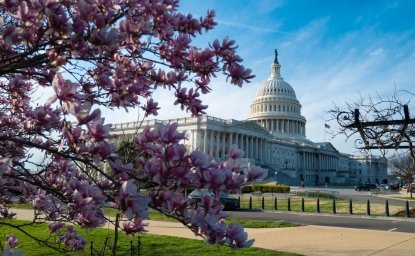- Part of Beyond a Single Story
- Podcast
What's Next for AGOA?

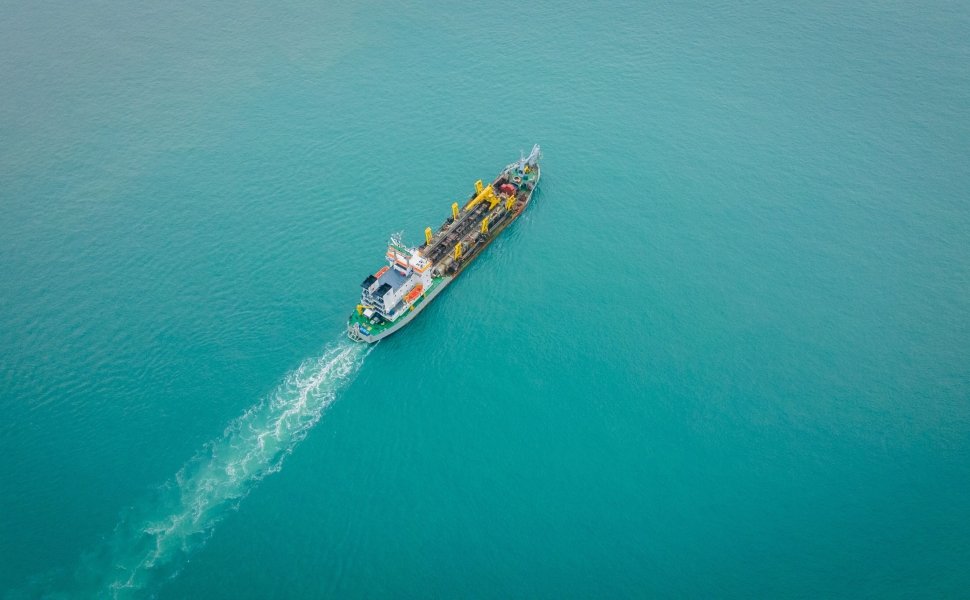
Africa Program director Oge Onubogu introduces her co-host for the season, Witney Schneidman, in this brand-new podcast series from the Wilson Center. Oge and Witney open the series by discussing the future of the African Growth and Opportunity Act (AGOA) and the people and ideas we will hear from throughout the series.
-
Transcript
This transcript has been lightly edited for length and clarity.
Oge Onubogu: [00:00:00] Welcome to Beyond a Single Story, a new podcast focused on multiple angles and different perspectives to better understand the U.S. 's evolving engagement with African countries. My name is Oge Onubogu, and I am the Director of the Africa Program at the Wilson Center in Washington, D.C. This podcast heeds the warning from Nigerian author Chimamanda Ngozi Adichie, about the danger of a single story. So for each season of Beyond a Single Story, a co host and I will focus on a different theme and policy area. Over multiple episodes with different experts, practitioners, researchers, policy makers, and everyday people, we will move away from single narratives, stereotypes and assumptions to provide a nuanced story of what is really at stake in U. S. Africa relations. We're excited for what's to come and so glad to have you join the story.
Our first season is titled AGOA: Road to Reauthorization. [00:01:00] We're focused on the African Growth and Opportunity Act. The Act, known by its acronym AGOA, was passed in 1999 and currently provides 32 African countries with duty free access to U. S. markets for a wide range of goods, such as textiles and agricultural products. AGOA is often referred to as a cornerstone of U. S. economic engagement with African countries. However, Without reauthorization, AGOA will expire in September 2025. Despite enjoying bipartisan support, reauthorization efforts remain stalled in Congress.
AGOA is at a critical moment in its history. The legislation is credited with creating hundreds of thousands of jobs across Africa and has played a key role in boosting economic growth on the continent. At the same time, little is spoken about this. the benefits to U. S. Businesses and Americans [00:02:00] over the course of this series, we will hear from the political leaders that brought ago it to life from U. S. And African business leaders and entrepreneurs utilizing the act, from policy makers currently implementing it, from civil society and labor leaders engaging in the conversation, and from thought leaders about what is next for U. S. Africa economic policy. Through all of these conversations, we will go beyond a single story.
I'm delighted to introduce my co host for the season, Witney Schneidman. Witney is a member of the Wilson Center Africa Program Advisory Council. He was Deputy Assistant Secretary of State for African Affairs during the Clinton administration and played a pivotal role in the passage of AGOA. He has over 30 years working with private companies across the African continent.
Witney, thank you so much for joining us today.
Witney Schneidman: Oge, it's great to be [00:03:00] here. Um, I'm really excited about this, uh, forum and, uh, being here to discuss this issue with you. Um, the many people who will come onto this, uh, podcast, I'm looking forward to that because there's no question that the reauthorization of AGOA is central to the U. S. African relationship and, uh, getting this piece of legislation renewed. Um, modernized, made more relevant for the 21st century is, uh, front and center of those of us engaged in U. S. African relations.
Oge Onubogu: This year, um, the U. S. government hosted the 21st AGOA Forum with the theme, Reimagining AGOA for an Inclusive, Sustainable, and Prosperous Tomorrow.
It's clear that with this theme, there is a sort of a direction of showing that this has evolved and is growing and becoming stronger over time. So could you talk a little bit more about the history [00:04:00] of AGOA? Previous forums and they have informed where our partnership is today.
Witney Schneidman: Well, um, yeah, thanks. Oge. I, I, I can, and, and we'll hear more about it from those who are responsible, but I first, Encountered the idea of AGOA about five years before it was passed into law. And that's when conversations were happening on the Hill, uh, in the wake of the, uh, passage of, of the North American Free Trade Act. And some of the folks responsible there said, what, what does this do for Africa?
And one young staffer said to his boss, it does nothing. And he said, well, let's do something. So that young staffer was Mike Williams, and he went to work and he got some ideas together and he took them to the continent and he met a young foreign service officer there named Rosa Whitaker, who was in the embassy in Abidjan.
And Rosa had been waiting for this moment. [00:05:00] Uh, cause she felt the need, there's a real need to do something. And um, so after meeting Mike, Rosa got a transfer from the embassy to Congressman Charlie Rangel's staff. And that began the dynamic. And, um, they brought all sorts of folks onto the Hill to discuss and I was part of it.
I was working in the private sector at that time and I could just see from, from that moment that something was new here was going on. And then I went into the Clinton administration and the Clinton administration's Africa policy was designed as the Africa policy of opportunity. Clearly. You know, channeling, um, AGOA.
And President Clinton, in three of the state of his unions addressed, underscored the importance of AGOA. So the effort to build the bipartisan consensus was well underway. It was passed through Congress. Uh, he signed it in May 2000. And in the legislation, it says that there should be an [00:06:00] AGOA forum every year.
And it didn't say it should alternate that came later, but the first forum was held in Madagascar, which I went to, and, uh, I think it alternated Madagascar and Mauritius, and it was, it was late in the year, it was after 9 11, and I remember folks talking about how the whole global air infrastructure had been closed down around that event, uh, President George W. Bush had a video message for us. And it really just got the whole process going. So I've participated in a number of the forum, uh, since then, but there is an energy about, uh, this year's forum that I just think speaks to the enduring nature of this legislation, what it has been and what it can be.
As you know, since you were involved in some of those conversations with us that the Wilson Center hosted the, uh, civil society and organized labor forum portion of the [00:07:00] AGOA forum.
And those conversations were, to be honest with you, quite unique. And this is the first one that I remember where labor and civil society had such a prominent role. And for those of us who focus on the private sector, we often overlook.
The importance of labor and civil society. But, you know, AGOA was designed to make sure those two elements were included. And. It, there's just no question that the role of civil society is central to a successful investment in Africa. The role of labor is essential to the, uh, successful investment in Africa.
Takes on very different forms than here in the United States. There aren't the big labor unions in, uh, uh, on the continent, maybe apart from South Africa, uh, that there are here. But, but training, skills development, including labor, uh, is just central to what I think the U. S. [00:08:00] wants to achieve, uh, through AGOA and the role of civil society.
Which helps to keep everybody accountable through transparency, through, uh, adhering to, uh, uh, environmental standards, obviously labor laws. So, uh, this forum, I think, was quite special in that respect.
Oge Onubogu: You know, one of the things that we sought out to accomplish through the forum is that we always talk about AGOA being, you know, the cornerstone of U.S. Africa trade relations. But at the core from the very beginning, we thought about how can we move this from the abstract and actually really talk about how AGOA is relevant to not only African businesses, but also U. S. businesses as well, which is important, which is really at the core of why this is a partnership.
How are we telling the story of why AGOA reauthorization is important for not only Africa, but also for the U. S. And I think, you know, I would love to really hear your thoughts on Um, [00:09:00] you've, you've mentioned some of the uniqueness that you've seen with labor unions being involved in, in these conversations compared to past forums.
I wonder if you could compare some more from the forum that, that happened this year to what you saw out in South Africa in November.
Witney Schneidman: Well, in South Africa in November. The South African government did an excellent job of bringing together a huge exposition of companies on the continent who were there displaying their wares.
And that to me was a tremendous signal of not only that Africa is open for business, but that Africa is ready for business. And they're keen to do business with the United States. Um, even, even countries that maybe were ineligible were there, uh, in, uh, in South Africa. And that underscored, in my mind, the relevance of AGOA [00:10:00] today.
We can get into the data and who's benefited and who hasn't, has it been beneficial, has it not. But there's no question that it is a vehicle of opportunity. And I think that's the challenge in front of us. That's the challenge of it. To all the stakeholders, how do you maximize that opportunity?
Oge Onubogu: No, that's a very important point. And I'm hoping that throughout this podcast and with the different guests and individuals that we'll get a chance to speak to, that we'll be able to, you know, focus on that point you made about how do we really ensure that we make use of, of AGOA as a vehicle of opportunity. I think for me, that's one part of this podcast that really gets me very excited because we will get to talk with businesses, uh, small business owners, um, individuals from government, different voices from civil society and, uh, the labor unions to really get their, their views and perspectives on, on AGOA and what [00:11:00] it's reauthorization, uh, would mean for U. S. and African, uh, businesses. Wondering if you could talk about some of the key things that you saw coming out from the AGOA forum this year.
Are there some key recommendations that we should keep our eyes on as we think about reauthorization? Were there some key statements that were made by folks from, by the African trade ministers or from individuals in the administration? Things that we should really sort of focus on and just keep our eyes on as we look towards reauthorization.
Witney Schneidman: Yeah, um, really good question. So a couple of key points came out of the AGOA forum this year, uh, that was here in Washington. One was a commitment by all African AGOA beneficiaries to produce AGOA utilization strategies. When AGOA was renewed in, um, 2015 by the U. S. Congress, Congress [00:12:00] called on AGOA beneficiaries to develop these strategies, to increase the utilization.
Well, today about half the countries have produced them. So I think there is a recognition that, uh, these can be quite beneficial. These can be roadmaps, uh, that, that local businesses can utilize, that civil society can engage in, that labor can engage in. But the strategies, I think, also have a benefit, a benefit for, uh, for the implementation of the African Continental Free Trade Agreement, which was also another important theme of discussion around the AGOA forum, because this is the first renewal of AGOA to now have the African Continental Free Trade Agreement sort of with us.
And it's incumbent on us to figure out not only how do we strengthen AGOA, but how do we. Do that in a way that strengthens the implementation of the AFCFTA, uh, as it is known. I think the second [00:13:00] point that I would underscore is the depth of bipartisan support for AGOA. And we heard that from the members of Congress who, uh, participated.
And that's, that's incredibly important because this is what AGOA did when it was passed in 2000. It forged this bipartisan consensus in Congress. That the U. S. has interests in Africa worth investing in. And that bipartisan consensus has been pretty durable over the last 25 years, even to the point where it was the engine that passed the BUILD Act, which created the U. S. Development Finance Corporation under the Trump administration. So I'm relatively hopeful that this bipartisan consensus Uh, that we saw on display in July will continue into January and February of next year.
Oge Onubogu: Definitely. And, you know, apart from it being bipartisan, there's also the bicameral support where it's not just, you know, with the political parties, but we also see with the House [00:14:00] and Senate as well.
So there is huge support here, uh, for this. And like you, I, I want to stay and remain optimistic that we will see this, uh, pass. But if we go back to, you know, sort of the origin of Agoa and we see how much things have changed on the continent since then. population has grown since then. We've seen new areas of innovation from technology to the creative industries.
We have more young people who are now connected to the internet than we'd seen in 2000 when AGOA first came to play. So as we think about, you know, moving into the future, you know, there are conversations about really strengthening a 21st century U. S. Africa partnership. Um, how can we see AGOA being sort of integral in this conversation when we talk about building this 21st century U. S. Africa partnership?
Witney Schneidman: Well, you've touched on many aspects that I hope we can come back [00:15:00] to during the course of this forum, but, but one you didn't mention was the geopolitical context, which I have to get into for a second because, you know, when AGOA was passed in 2000, like the Cold War had ended and we're seeing this.
Explosion of democratic governments and economic growth and, um, AGOA was intended not only as an instrument of economic development and using trade as a stimulus to development, but it was also used to incentivize good governance and good economic policy. Here we are 25 years later, and I would argue that the U. S. still has a role to support those elements that are aspiring to. Democratic governance. And we see through polling Afro barometer, polling, you know, two thirds of folks on the continent want to live under a democratic government. So there's still a role for the U S to partner in that respect. But I would argue that the time now is to separate AGOA as role in [00:16:00] that out of the equation and to focus on AGOA as a trade policy.
We have other instruments and other incentives. to advance our democratic agenda and support with, with governments on the continent. But I would like to see AGOA would be, you know, purely a trade bill and legislation that would enable us companies to really compete. And I think by offering more predictability in that respect and, uh, one thing I like about the Risch Coons legislation that has been put forward as a vehicle for reauthorizing AGOA is that it gives the president much more flexibility about how to respond to situations when there's been democratic backsliding, You don't have to be automatically expelled from AGOA.
You know, he, a president can, he or she can choose to sort of exclude a certain sector or write a letter or do nothing in the national interest. And I [00:17:00] think we need that kind of flexibility just given the competitive world we're in today.
Oge Onubogu: And hopefully we'll be able to discuss that more because, you know, the question or the discussion of points has come up.
As you know, is AGOA a trade tool or is it a governance tool? And I'm hoping that through our different conversations, we'll be able to unpack what the different, um, you know, tools are out there, um, that could be used or explored further by partners in civil society or those in the labor unions as we talk about AGOA reauthorization and implementation.
So you raised a few points about, you know, sort of the importance of wanting to see AGOA being Utilized as more of a trade tool and the president being able to tap into some of the other tools that we have to be able to hold governments accountable for human rights violations, democracy backsliding and the rest of that.
Still on that point on trade, when I think about American small businesses, those of them [00:18:00] that might be thinking about, you know, what are the options for me to break into the African market? Um, how can I, um, utilize this more effectively? Because I think there is some work that needs to be done. Well, not some work.
There is a lot of work that needs to be done on our part to ensure that the American, uh, public is more aware. of AGOA. One, how to utilize it. And two, um, more sort of awareness of, you know, are there products, our day to day products that we use every day in our local Walmart or Costco that, you know, we're able to access some of these things at some of these prices because of AGOA.
So what type of work, are there avenues for us to sort of increase more awareness and what could be done? Are there U. S. agencies that could do more?
Witney Schneidman: So, you know, how AGOA benefits, let me start there, [00:19:00] is so important, and, and I think this is one unsung success of AGOA. Because when, when I go to buy shirts, or pants.
I mean, I, I go into the store and the first thing I look at is not so much the price. Obviously price is important, but the label. Where's this shirt made? Where are these pants made? Where are these socks made? And, and when I see it says, you know, jeans made in Tanzania and made in Kenya, a shirt. Made in Lesotho or made in Mauritius in Madagascar.
Sitting right next to a pile of clothing that says made in Poland, made in Mexico. I know we're doing our job. You know, we're changing the image in the minds of American consumers about these products. And they go, Oh, I didn't know these came from Africa. This is, this is really cool. I really love this stuff.
So I think that's, that's what we've started. And that's what we have to build on. Um, we've seen other products, obviously. Uh, coffee's coming into [00:20:00] the U. S. that's well branded, uh, by companies as large as Starbucks, but other companies smaller, uh, Kahawa 1893 is a recent addition to the, uh, uh, market. We're seeing it happening.
So to your question, how do we see more of this? I think one of the, uh, Biden administration's very interesting policy developments was the president's advisory council. Um, and I think that's a great platform for engaging our small business administration and the other commerce department, president's advisory council on doing business in Africa and bringing those together and really unlocking.
You know, resources that help small business gain access to the African market, whether it's in cosmetics, whether it's in manufacturing, whether it's in entertainment, whether it's in fashion, there are a lot of opportunities that are much more accessible today because of the [00:21:00] internet. Um, I think cost of travel has come down.
I think it's possible to do this. And, uh, opportunities for folks to connect. So this is really, I think, an area that we're going to want to explore during the course of this podcast.
Oge Onubogu: Knowing that there are, as we look at several issues on the continent, several things are interrelated. When we talk about trade, there's an interrelation sometimes with governance.
You talk about security. Um, what efforts as we think about reauthorization, what a Agoa 2.0, ensuring that there is sort of coordination within the inter-agency, as it were. Is there a space for AGOA there in the discussions? Making sure that all those different actors are sort of aware of what, even though AGOA may not sit directly under one of those sectors, but at least there is an important role that it plays in our engagement with the African continent.
Witney Schneidman: Well, I think Prosper Africa has been doing a good job. I mean, Prosper Africa was designed to have a big, [00:22:00] big job, and that is uniting the 17, 18, uh, U. S. agencies responsible for trade. And they've created the Africa Trade Desk, and, you know, that's, that's a forum for folks to reach out on, uh, for companies from the continent to sort of display their wares for.
for potential buyers from the U. S., and that's what we need more of. We need more people to people connections, business to business connections. We need, uh, we need trade missions to the continent. We need trade missions from the continent. But we also have to go deeper, and that's into the U. S. states. All 50 U. S. states export to Africa, and every state has a state trade agency that is responsible for trade and investment. And engaging some of the states, state of Texas, California, Illinois, uh, and others, Maryland, that do, that are really interested in doing business that have large diaspora populations. [00:23:00] I think that's, uh, um, another area that, that can be engaged quite, uh, beneficiary.
Oge Onubogu: Yeah. I'm, I'm hoping that, you know, an area on subnational engagement that we will also get to discuss that during this podcast. I recall that the state of Virginia, they actually had a trade mission out to West Africa this year, early this year as well. So really thinking about how we engage states in the U. S., raising the awareness about AGOA at the subnational level. There are a lot of opportunities there. So that, that is, uh, you know, definitely an area that I'm hoping we can explore more, um, on the podcast. So I'm thinking, Witney, are there any other key points that you wanna add to, to this conversation on, on AGOA some areas we may have left out in this initial discussion, knowing fully well that we're going to, you know, have a few more episodes to, to drill down even further on some of the other topics.
Witney Schneidman: Yeah, I guess, you know, the, the last area I want to touch on for, for now is something that you raised and that's, that's the [00:24:00] creative sector. It's just so freaking vital, if I can put it like that, um, because this is Africa telling Africa's story and, and we're seeing, you know, Netflix, we're seeing other.
Um, but we need to hear from those folks. Why are they doing that? How's that working? And then we need to hear from the African side. How's it not working? And how, how can it be done better? And, and on the role of fashion, that's another. way in which Africa is telling its story, appealing directly to the, uh, um, American consumer.
I'm still waiting for the first AGOA fashion show, you know, because I think that, that has a lot of, a lot of, a lot of opportunity there and it could be really interesting. But I think, you know, these are areas that we can get into.
Oge Onubogu: Well, maybe Witney will have you model some of these clothes for the AGOA fashion show.[00:25:00]
But thank you. This has been a really, really interesting conversation and I'm really looking forward to us, you know, breaking down these issues as we bring in these interesting guests from the private sector, from the creative industries, those looking at digital, uh, the digital technology folks at the subnational level.
As we talk more about AGOA, as we really move the conversation from the abstract and bring it into what this really means for everyday people or everyday businesses and those who are consumers of products too as well. Thank you for joining us on this first episode. Next week, we will look at the origins of AGOA to help inform how we got to this moment.
Our future episodes will explore AGOA's impact for businesses in Africa and the United States, AGOA's effect on civil society and small and medium enterprises, and a special episode on what comes next for reauthorization under the new administration. [00:26:00] Throughout the season, you will hear from a diverse range of perspectives and backgrounds, each taking us beyond a single story.
Special thanks to the production team that made this series possible. This episode was produced by Aaron Stanley and Nathaniel Oakes. Technical assistance was provided by Shaarona Harris and editing was done by Brian Prevost. The Africa program is part of the Wilson Center, a congressionally chartered think tank that provides insights on global affairs to policy makers and the public through deep research, impartial analysis and independent scholarship.
Moderators
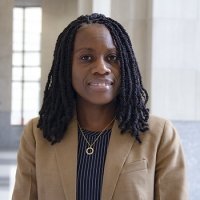
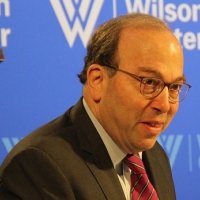

Africa Program
The Africa Program works to address the most critical issues facing Africa and US-Africa relations, build mutually beneficial US-Africa relations, and enhance knowledge and understanding about Africa in the United States. The Program achieves its mission through in-depth research and analyses, public discussion, working groups, and briefings that bring together policymakers, practitioners, and subject matter experts to analyze and offer practical options for tackling key challenges in Africa and in US-Africa relations. Read more

Related Episodes
Browse all episodes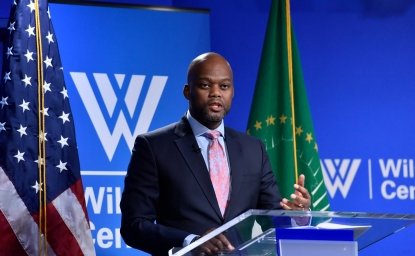
- Trade
One Continent, One Market: How the AfCFTA Can Redefine US-Africa Trade
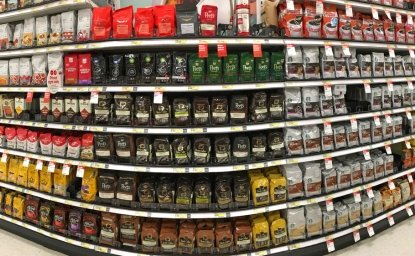
- Supply Chains
How Do African Products Support US Consumers? African Suppliers, US Buyers, and New Markets
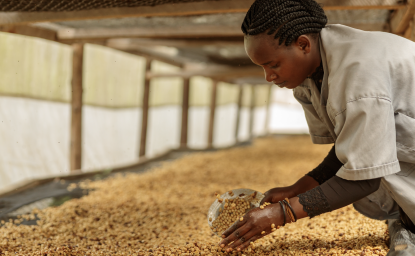
Building Brands, Connecting Continents: AGOA Entrepreneurs in the US Market
